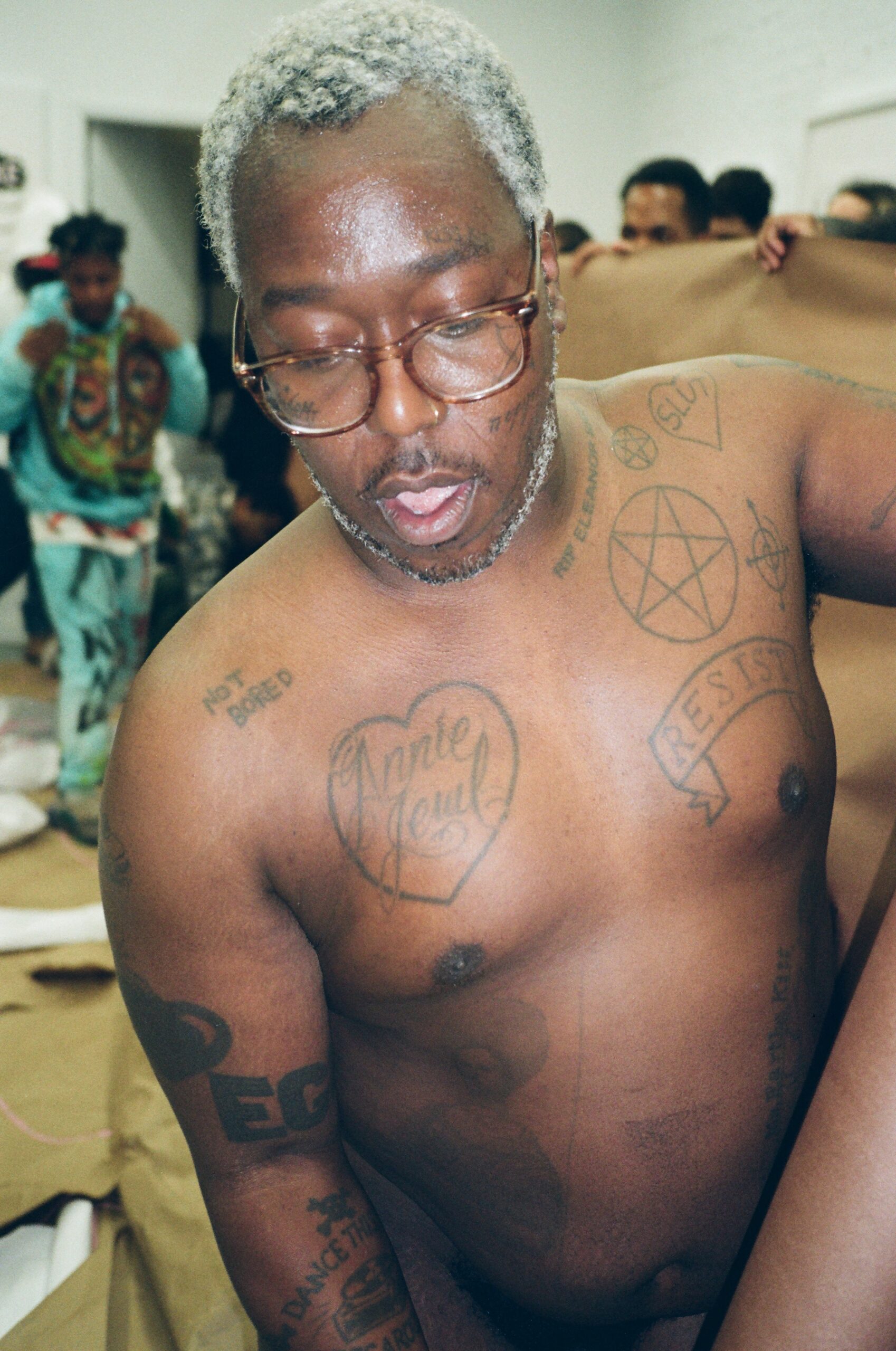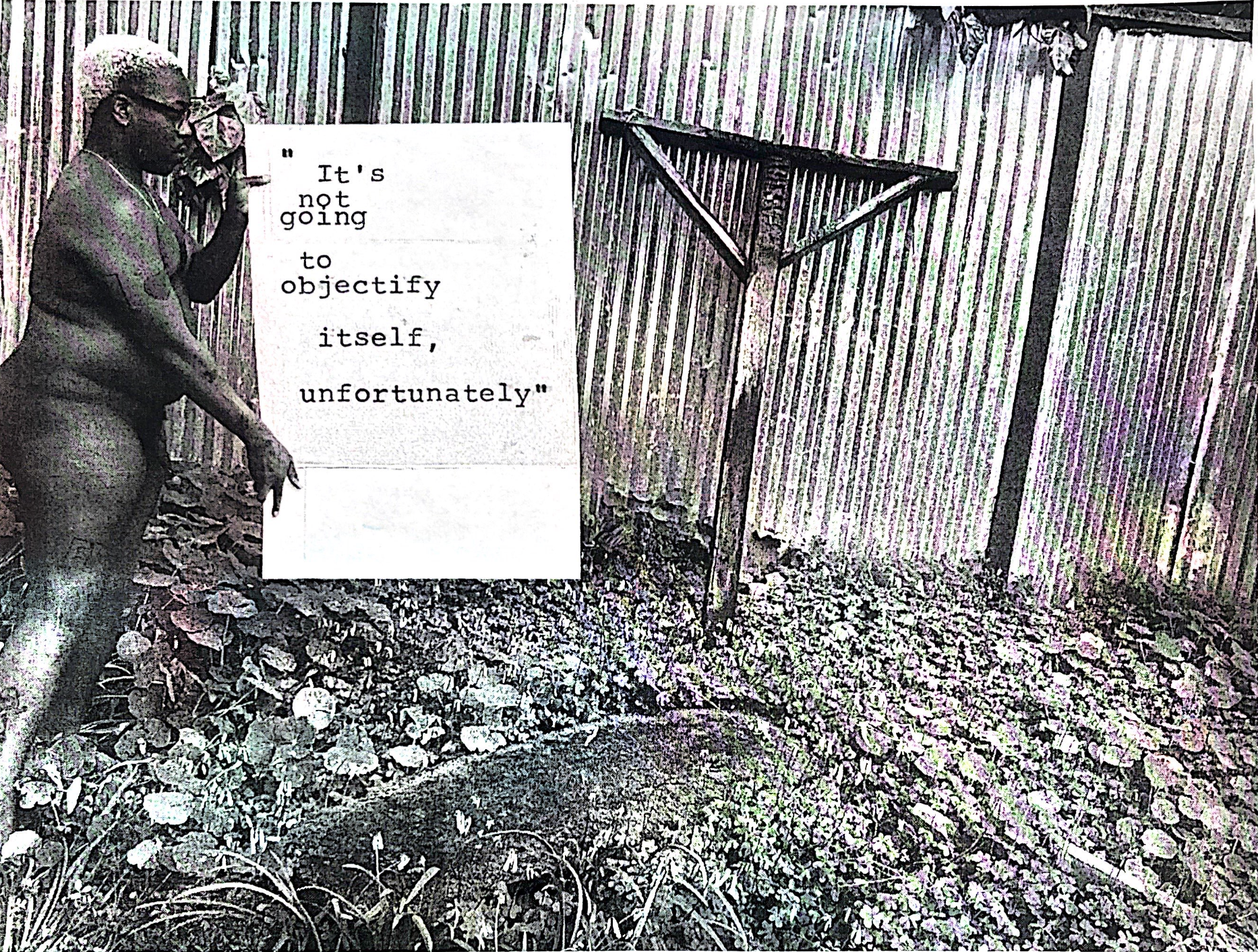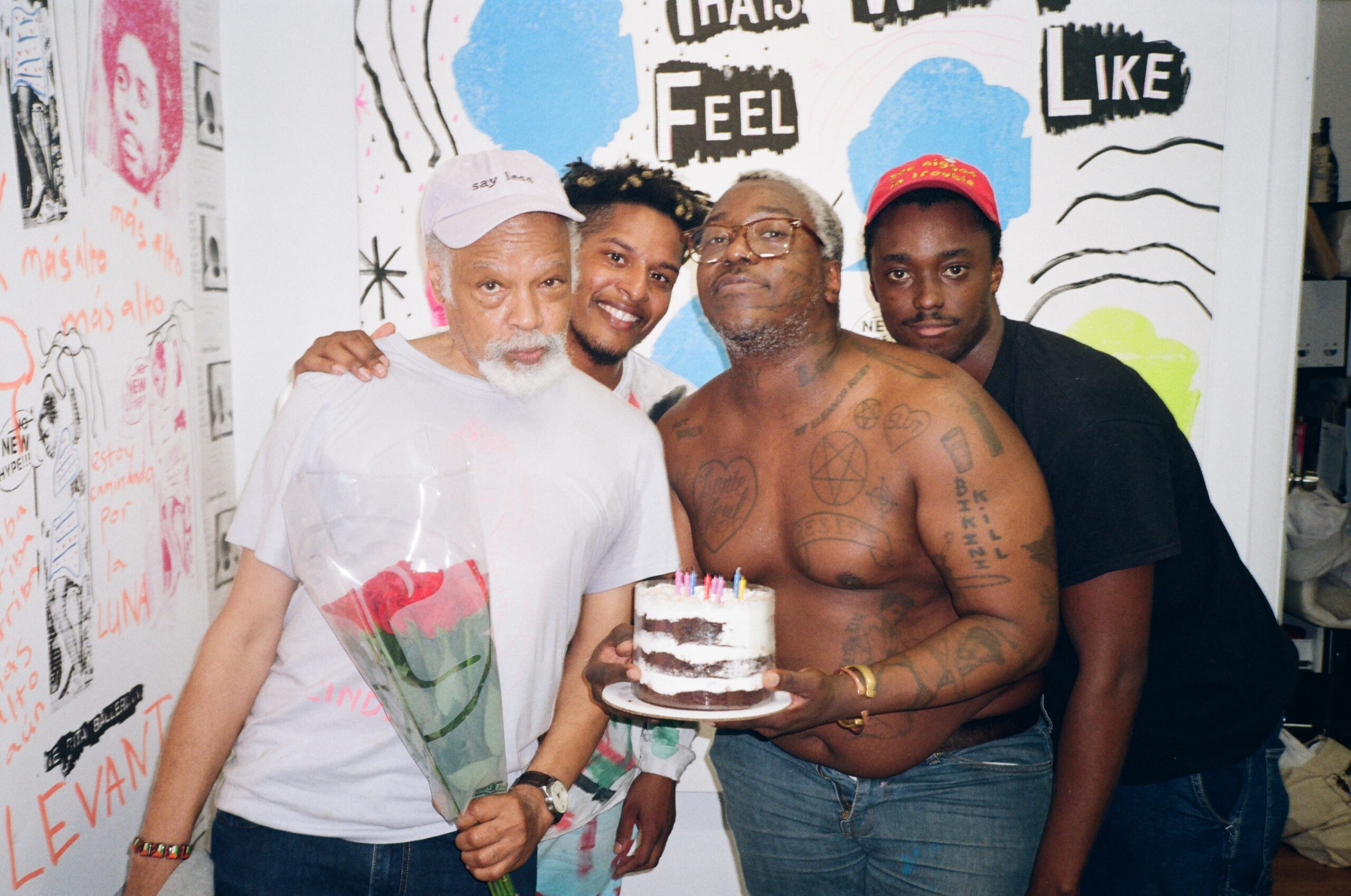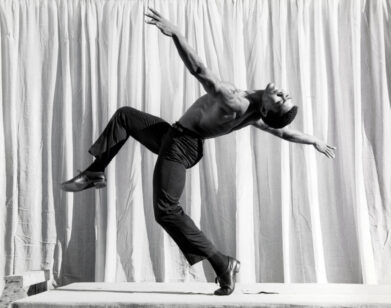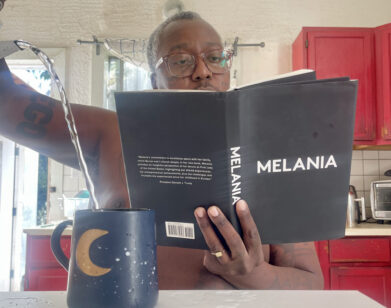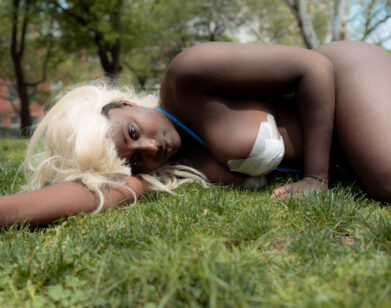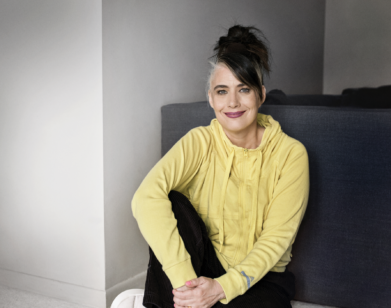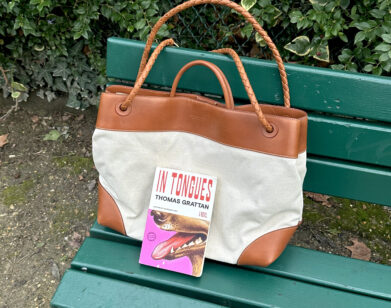OPENING
Brontez Purnell and Charlie Engman on Branding, Bottoms, and Being Objectified
Funnily enough, I first met Brontez Purnell photographing him for Interview. Well, actually, no—I first met Brontez on the bedside table of an ex. Fluffing the pillows one night, I glanced down to find the words JOHNNY WOULD YOU LOVE ME IF MY DICK WERE BIGGER glaring at me with charmingly vulnerable vulgarity (a hallmark of Purnell’s, I would soon learn). I thought to myself, “Whoever wrote this book is a blessing.” When I finally did meet the author of 100 Boyfriends, after practically begging Interview to let me shoot him, he answered the door to his Oakland apartment in nothing but a bath towel (he was still getting ready). After hurriedly ushering me in to set up my lights, he rushed back to the bathroom, letting the towel fall just in time for everyone on set to glimpse the dick in question.
It was a surprisingly disarming gesture. Done by anyone else, it might have felt skeezy or delusional or just, like, weird, but done by Brontez it somehow had grace. It made him seem both powerful and debased, sincere and wily, innocent and world-weary—and it was funny to boot. And this ambiguous, oddly generous exposure runs through his writing, music, performances, and images (Brontez is a true polymath). He manages to draw out the contradictions of living in the world in a body with an elegant and goofy economy of means—give him a towel and he’ll show you humanity. In any case, the towel stunt was lovely foreplay to friendship. So when he was in New York to install his show “Anti-Alter Ego” at the downtown gallery Trotter&Sholer, he stopped by my apartment to snuggle and entertain my questions about his art and the show.
———
CHARLIE ENGMAN: You told me your show was “an intervention on persona,” and then you told me this was jargon you learned from pretentious white people. Are you staging an intervention on your pretentious white persona?
BRONTEZ PURNELL: What a triggering fucking question. But don’t take it the wrong way, I kind of like being triggered these days? But anyway, my “pretentious white persona.”-So like, when a white person declares some shit like I’m a black woman in a white body, it’s usually like, a liberatory moment, it’s always declared as an affirmative. When a Black body has to deal with the highly conceptual parts of them that are “white,” it’s usually tied to like, self-loathing, survival, or trying to talk in a neutral American accent when getting a job so that when you in inevitably have to cuss your white boss out in full blown nigga mode, they will be impressed by your sense of range. Plus, the white people I tend to “emulate” or call heroes are generally suicidal, junkie, commie, sex workers whose whiteness itself doesn’t bend per se to the respectable arc of whiteness. I will spare you this long-winded intellectual discourse and say I’m intervening on persona in general, like the secular definition of “persona,” the trappings of public image none of us get to shake. I have an art degree from Berkeley so I am one of those niggas that had to learn how to talk to white institutions and subsequently be able to write a 5,500-word essay about why a painting is blue. But this isn’t about all that.
ENGMAN: I once had a boyfriend who wore huge, crazy art-mom glasses that drew a lot of attention while simultaneously almost completely obscuring his actual face. He told me he liked wearing them because he could hide behind them—people looked at his glasses, not at him. Do you ever hide behind your art?
PURNELL: Nah. I wish. My art tends to be full-frontal. It exposes more than it hides.
ENGMAN: Truth or fiction aside, you’ve put yourself squarely in the center of everything you make. In this era where everyone is urged to transform themselves—their identity, their aesthetics, their opinions, their experiences—into social or financial capital, do you consider yourself a brand? And if you are one, can you give me an elevator pitch for your ad campaign? The visual and the copy.
PURNELL: Well, this is one of the things my show “Anti-Alter Ego” is deeply asking. What exactly is branding even? I think a lot of people haven’t thought this through. Like, in an era where “self-identify” seems to be sold as indisputable truth—and I hold a lot of space for this ‘cause how we operate from our sense of self holds so much importance—yet, still, public image is what others think of you, not what we think of ourselves. So, at the end of the day, who controls “brand”? What sense does this all make? Essentially both self-identity at its worst can be a form of self-deception and public image is equally as dangerous in a world that constantly and deliberately misunderstands us. The “constructed self” versus “the authentic self” when set against each other can both feel like para-fictional abstracts. Brands are about perceived persona and perceived persona versus who a person really might actually be can feel like unanswerable things. A set of facts about someone might not always equal the truth about them, you know what I mean? I can’t even conceive of what my brand is, cause the thought of it sounds exhausting and in the eyes of the wrong person totally fucking terrifying. Maybe deep avoidance is my brand?
ENGMAN: From my experience, you seem to enjoy being photographed. Do you? What do you get out of being photographed? More specifically, what do you get out of being objectified?
PURNELL: Well, cameras are basically mirrors, and if you think about it they both are like, these magical objects. But to keep it simple, I think, in a really face-value kind of way, photos represent a sort of “truth”? The show deals with a lot of self-portraits with text intervention, because as a performer I’m always at the end of other people’s shutters but I have never really self-authored my own photos, or self-authored them in a way that felt like my truest self. Also, I’ve never in my life been one-hundred percent comfortable with the way I look, but photos make me confront myself, and most importantly they are a marker of time in a world where, as I get older, the line between then and now gets more and more blurry.
ENGMAN: I was struck by the recurring phrase “willfully non-judgmental” in your book 100 Boyfriends. Can you elaborate on what that means?
PURNELL: It takes a lot of energy to deeply judge, and I’m saying this with respect to the fact that the word “judgment” basically never has a positive connotation. First and foremost, how and why we judge something always says more about us than the object being observed. Life makes it so situations, people, and events hold great capacity to be disappointing or at the very least just not be what we pictured. “Willfully non-judgmental” is shorthand for I’m trying to err on the side of generosity and deep sympathy. And let’s face it, a lot of these judgmental bitches out here could afford to intuit things with a wider lens.
ENGMAN: What’s your relationship to vulnerability? What’s your art’s relationship to vulnerability? What is the relationship between vulnerability and authenticity, or am I projecting?
PURNELL: We’re all projecting all the time and that’s also what the show is about. I mean, vulnerability is hard cause people always want to make it into this power game where, if they view you as vulnerable alongside hailing you as brave, they can also cast you as an object of pity or see what is vulnerable about you as like, this glitch in your armor that can be weaponized against you or pathologized. Again, I just have a different relation to vulnerability ‘cause sometimes I’m called that when really, I’m just bluntly stating a feeling, however ballistic. I like it more when vulnerability is tied to what is most human about someone, but we don’t always get the much grace from the world.
ENGMAN: How would you describe yourself?
PURNELL: Sparingly.
ENGMAN: How would you describe yourself from my perspective?
PURNELL: We are so clearly going to be future ex-husbands who never in actuality fall out of love.
ENGMAN: How would you describe yourself from your mother’s perspective?
PURNELL: My mom once said to me in a surprisingly non-judgmental tone, “I bet you don’t even know who you caught HIV from.”
ENGMAN: How would you describe yourself from the perspective of the last person you fucked?
PURNELL: I got power-dom topped by this like, white twink in Bushwick who had this vibe where you could tell he was like, the only white boy at his very Black high school growing up. He was all about my fat ass, like the type of chocolate-cheek-obsessed white twink that literally be fucking you and is like goddamn that ass fat as fuck yo. Which I love, cause most white twink tops be saying whack shit like my cooooooock. But anyway, he bust it raw and took a video, I told him he could video my face in it and air drop to all the boys on the block so they know what a fucking slut I am. We got stoned and talked shit and I was like “Yeah, like fools be thinking I’m a ratchet ass ghetto, pussy bottom” and he was like, “Well, you do have face tattoos.” Long story short, he described me as “beautiful.”

